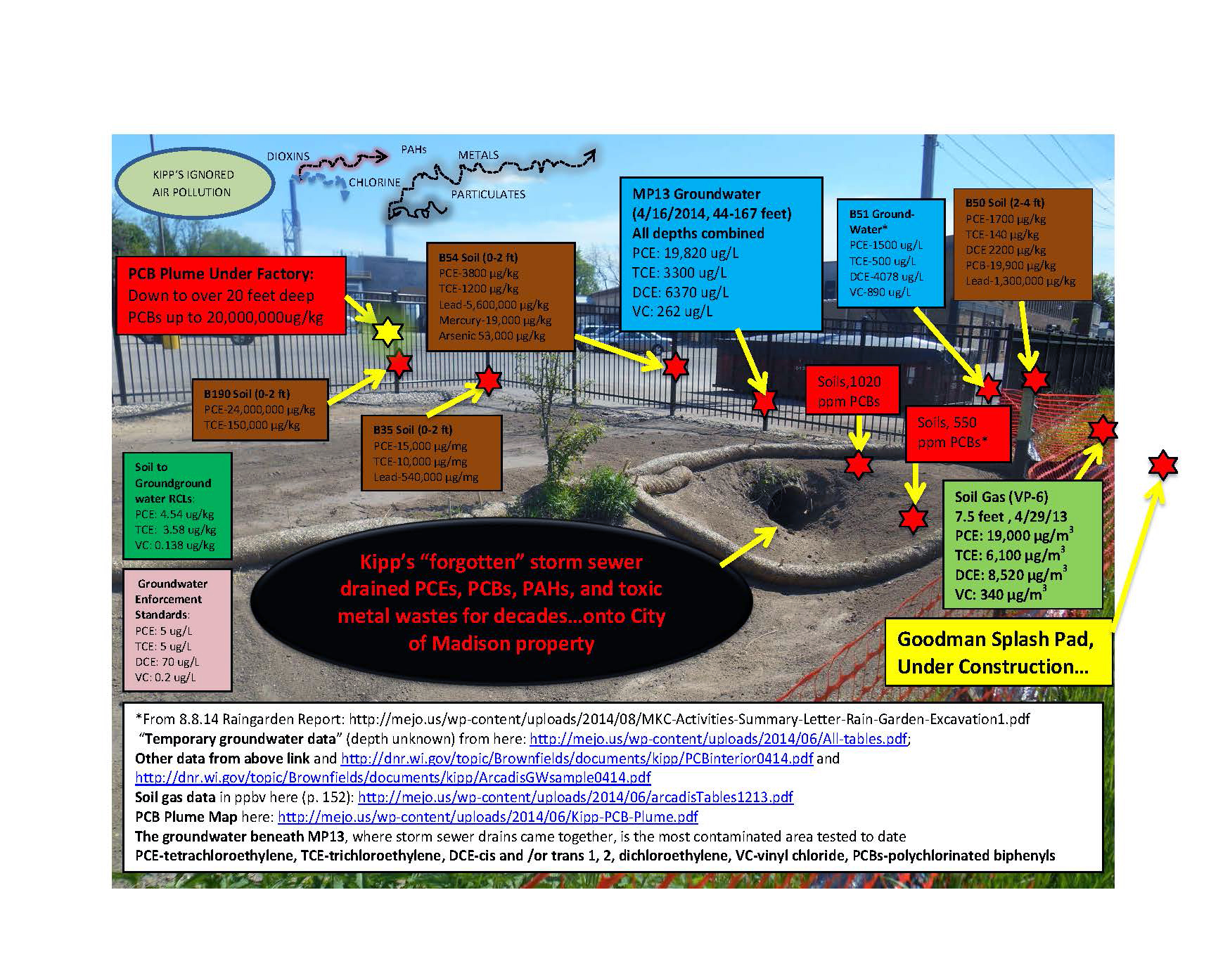(High resolution version of above graphic here)
SUMMARY: The City of Madison wishes to extend a lease with Madison-Kipp Corp. through 2023 that will allow Kipp to control the rain garden it has polluted, continue to use part of the north parking lot (which it has also contaminated), and will give full credit towards its lease costs for a wooden fence that allegedly blocks sound. Meanwhile, people who live next to Kipp say that noise from the factory has been louder than ever, and often is the worst in the middle of the night. [1]
Given Kipp’s long history of polluting Starkweather Creek and Lake Monona through its unmonitored discharges into the City storm water drains (including one in the rain garden, where most of Kipp’s contaminated stormwater discharges are released), it’s curious that the City would now like to give Kipp control over this land.
DETAILS: The City of Madison has a long relationship with Madison-Kipp Corp. The city owns the land under the Kipp Fair Oaks factory and under the north parking lot at the Kipp Waubesa factory. Now the City wants to lease its heavily-polluted rain garden to Kipp for free (zero rent because of the full credit for the “sound blocking” fence).
Runoff from nearly the entire Kipp Waubesa factory property has been going into a City stormwater drain for many decades (a century?). In 2006, the City built the ill-fated rain garden where this pipe discharges, despite existing documentation of extensive PCE contamination throughout the Kipp site. This area was already leased to Kipp, so the City amended its lease, took back the land and gave Kipp a $900 lease credit. From the 2009 amended lease:
During the time of the recent construction of the new Goodman Community Center at 149 Waubesa Street, the City of Madison constructed a storm water management surface water retention facility adjacent to the East Rail Corridor Bike Path. The facility was constructed in a portion of the leased premises that the City leased to the Madison-Kipp Corporation (MKC) beginning in 1998. In order to correct the situation, it is necessary to amend the lease to remove that portion of the leased premises that the City reoccupied. The portion contains approximately 2,100 square feet and its removal equates to a permanent reduction of the annual rent of $900.
In 2012 and 2013, several toxic contaminants, including PCE, PCBs, PAHs and metals were discovered in rain garden soils (see the main graphic above here). Soil PCB levels in some spots were many order of magnitude above DNR standards for direct contact. Several rounds of excavation have been done there, but the big question still remains: where did all this pollution come from?
MEJO has learned of a never-before disclosed Kipp factory drainage system that goes under the factory and leads to the stormwater drain and ditch (leading to Starkweather Creek, which eventually drains into Lake Monona). Historically, PCBs, PCEs, PAHs, dioxins, metals, and other unknown (unmeasured) chemicals from Kipp processes have flowed into this drainage system.
The City does not know the full extent of this drainage system and has not investigated what chemicals are currently draining into it from Kipp’s air vents/stacks and ongoing remediation projects–or what might be entering it from under the Kipp factory.
It has finally been made public that Kipp had a secret trench in its factory that drained into the City stormwater drain. EPA is now working to get Kipp to remediate the unbelievably high levels of PCBs under the factory. FYI: EPA still hasn’t settled with Kipp over its air pollution permit notice of violation. Perhaps the City should investigate the toxins going into the rain garden before it hands it over to Kipp.

Kipp has polluted this City land for a century (along with Kipp’s City-owned parking lot). Why should the City allow Kipp to have control of public land that it has treated so badly? Is there any evidence that Kipp can be a “good steward”of public lands? Since this land is adjacent to the City bike path and a community center, the City might be wise to keep control of it rather than allow a lessee with such a bad track record control it. Instead, this public rain garden will now become Kipp’s private property.And people who live along Waubesa and Marquette Streets, as well as those families who use the Goodman Community Center, not to mention the parents of all the children who will use the new splash pad next year (right next to the rain garden!), should know about this and have a chance to tell District 6 Alder Marsha Rummel and the City if they agree with the wisdom of giving Kipp control of more public land. There should be a public neighborhood meeting at the Goodman Center before the Madison City Council allows Kipp to lease the rain garden.
Addendum: The “sound blocking” wooden fence was supposed to be on the north boundary too (along the bike path, between Kipp and the Goodman Community Center. This wasn’t built. Here is the proposed location per the 2009 amended lease.
[1] Kipp and government agencies attribute this increased noise to the testing and construction of the groundwater remediation system. However, many people living on Marquette Street have been experiencing increased noises from Kipp since before this construction started. Also, the noise often goes all night long and people say they cannot sleep. Why does Kipp need to do this noisy work all night long?

